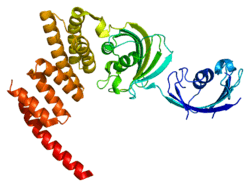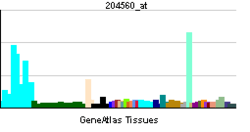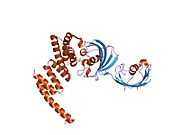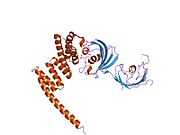FKBP5
FK506 binding protein 5, also known as FKBP5, is a protein which in humans is encoded by the FKBP5 gene.[1]
Function
The protein encoded by this gene is a member of the immunophilin protein family, which play a role in immunoregulation and basic cellular processes involving protein folding and trafficking. This encoded protein is a cis-trans prolyl isomerase that binds to the immunosuppressants FK506 and rapamycin. It is thought to mediate calcineurin inhibition. It also interacts functionally with mature corticoid receptor hetero-complexes (i.e. progesterone-, glucocorticoid-, mineralcorticoid-receptor complexes) along with the 90 kDa heat shock protein and P23 protein.
Clinical significance
Genetic studies have identified a role for FKBP5 in posttraumatic stress disorder, depression and anxiety.[2] For example, single nucleotide polymorphisms (SNPs) in FKBP5 have been found to interact with childhood trauma to predict severity of adult posttraumatic stress disorder (PTSD).[3] These findings suggest that individuals with these SNPs who are abused as children are more susceptible to PTSD as adults. FKBP5 has also been found to be less expressed in individuals with current PTSD.[4] The FKBP5 gene has been found to have multiple polyadenylation sites[1] and is statistically associated with a higher rate of depressive disorders.[5]
Interactions
FKBP5 has been shown to interact with Heat shock protein 90kDa alpha (cytosolic), member A1.[6]
See also
References
- ↑ 1.0 1.1 "Entrez Gene: FKBP5 FK506 binding protein 5".
- ↑ http://www.psychologytoday.com/blog/mouse-man/200811/gene-anxiety-depression-and-posttraumatic-stress-disorder-fkbp5
- ↑ Binder EB, Bradley RG, Liu W, Epstein MP, Deveau TC, Mercer KB et al. (2008). "Association of FKBP5 polymorphisms and childhood abuse with risk of posttraumatic stress disorder symptoms in adults". JAMA 299 (11): 1291–305. doi:10.1001/jama.299.11.1291. PMC 2441757. PMID 18349090.
- ↑ Yehuda R, Cai G, Golier JA, Sarapas C, Galea S, Ising M et al. (2009). "Gene expression patterns associated with posttraumatic stress disorder following exposure to the World Trade Center attacks". Biol. Psychiatry 66 (7): 708–11. doi:10.1016/j.biopsych.2009.02.034. PMID 19393990.
- ↑ Binder EB, Salyakina D, Lichtner P, Wochnik GM, Ising M, Pütz B et al. (December 2004). "Polymorphisms in FKBP5 are associated with increased recurrence of depressive episodes and rapid response to antidepressant treatment". Nat. Genet. 36 (12): 1319–25. doi:10.1038/ng1479. PMID 15565110.
- ↑ Nair SC, Rimerman RA, Toran EJ, Chen S, Prapapanich V, Butts RN et al. (Feb 1997). "Molecular cloning of human FKBP51 and comparisons of immunophilin interactions with Hsp90 and progesterone receptor". Mol. Cell. Biol. 17 (2): 594–603. PMC 231784. PMID 9001212.
Further reading
- Schiene-Fischer C, Yu C (2001). "Receptor accessory folding helper enzymes: the functional role of peptidyl prolyl cis/trans isomerases". FEBS Lett. 495 (1-2): 1–6. doi:10.1016/S0014-5793(01)02326-2. PMID 11322937.
- Baughman G, Wiederrecht GJ, Campbell NF, Martin MM, Bourgeois S (1995). "FKBP51, a novel T-cell-specific immunophilin capable of calcineurin inhibition". Mol. Cell. Biol. 15 (8): 4395–402. PMC 230679. PMID 7542743.
- Smith DF, Baggenstoss BA, Marion TN, Rimerman RA (1993). "Two FKBP-related proteins are associated with progesterone receptor complexes". J. Biol. Chem. 268 (24): 18365–71. PMID 7688746.
- Smith DF, Albers MW, Schreiber SL, Leach KL, Deibel MR (1993). "FKBP54, a novel FK506-binding protein in avian progesterone receptor complexes and HeLa extracts". J. Biol. Chem. 268 (32): 24270–3. PMID 7693698.
- Maruyama K, Sugano S (1994). "Oligo-capping: a simple method to replace the cap structure of eukaryotic mRNAs with oligoribonucleotides". Gene 138 (1-2): 171–4. doi:10.1016/0378-1119(94)90802-8. PMID 8125298.
- Johnson J, Corbisier R, Stensgard B, Toft D (1996). "The involvement of p23, hsp90, and immunophilins in the assembly of progesterone receptor complexes". J. Steroid Biochem. Mol. Biol. 56 (1-6 Spec No): 31–7. doi:10.1016/0960-0760(95)00221-9. PMID 8603045.
- Nair SC, Rimerman RA, Toran EJ, Chen S, Prapapanich V, Butts RN et al. (1997). "Molecular cloning of human FKBP51 and comparisons of immunophilin interactions with Hsp90 and progesterone receptor". Mol. Cell. Biol. 17 (2): 594–603. PMC 231784. PMID 9001212.
- Baughman G, Wiederrecht GJ, Chang F, Martin MM, Bourgeois S (1997). "Tissue distribution and abundance of human FKBP51, and FK506-binding protein that can mediate calcineurin inhibition". Biochem. Biophys. Res. Commun. 232 (2): 437–43. doi:10.1006/bbrc.1997.6307. PMID 9125197.
- Suzuki Y, Yoshitomo-Nakagawa K, Maruyama K, Suyama A, Sugano S (1997). "Construction and characterization of a full length-enriched and a 5'-end-enriched cDNA library". Gene 200 (1-2): 149–56. doi:10.1016/S0378-1119(97)00411-3. PMID 9373149.
- Young JC, Obermann WM, Hartl FU (1998). "Specific binding of tetratricopeptide repeat proteins to the C-terminal 12-kDa domain of hsp90". J. Biol. Chem. 273 (29): 18007–10. doi:10.1074/jbc.273.29.18007. PMID 9660753.
- Hartley JL, Temple GF, Brasch MA (2000). "DNA cloning using in vitro site-specific recombination". Genome Res. 10 (11): 1788–95. doi:10.1101/gr.143000. PMC 310948. PMID 11076863.
- Wiemann S, Weil B, Wellenreuther R, Gassenhuber J, Glassl S, Ansorge W et al. (2001). "Toward a catalog of human genes and proteins: sequencing and analysis of 500 novel complete protein coding human cDNAs". Genome Res. 11 (3): 422–35. doi:10.1101/gr.GR1547R. PMC 311072. PMID 11230166.
- Pirkl F, Buchner J (2001). "Functional analysis of the Hsp90-associated human peptidyl prolyl cis/trans isomerases FKBP51, FKBP52 and Cyp40". J. Mol. Biol. 308 (4): 795–806. doi:10.1006/jmbi.2001.4595. PMID 11350175.
- Davies TH, Ning YM, Sánchez ER (2002). "A new first step in activation of steroid receptors: hormone-induced switching of FKBP51 and FKBP52 immunophilins". J. Biol. Chem. 277 (7): 4597–600. doi:10.1074/jbc.C100531200. PMID 11751894.
- Giraudier S, Chagraoui H, Komura E, Barnache S, Blanchet B, LeCouedic JP et al. (2002). "Overexpression of FKBP51 in idiopathic myelofibrosis regulates the growth factor independence of megakaryocyte progenitors". Blood 100 (8): 2932–40. doi:10.1182/blood-2002-02-0485. PMID 12351405.
- Sinars CR, Cheung-Flynn J, Rimerman RA, Scammell JG, Smith DF, Clardy J (2003). "Structure of the large FK506-binding protein FKBP51, an Hsp90-binding protein and a component of steroid receptor complexes". Proc. Natl. Acad. Sci. U.S.A. 100 (3): 868–73. doi:10.1073/pnas.0231020100. PMC 298693. PMID 12538866.
- Hubler TR, Denny WB, Valentine DL, Cheung-Flynn J, Smith DF, Scammell JG (2003). "The FK506-binding immunophilin FKBP51 is transcriptionally regulated by progestin and attenuates progestin responsiveness". Endocrinology 144 (6): 2380–7. doi:10.1210/en.2003-0092. PMID 12746298.
- Bouwmeester T, Bauch A, Ruffner H, Angrand PO, Bergamini G, Croughton K et al. (2004). "A physical and functional map of the human TNF-alpha/NF-kappa B signal transduction pathway". Nat. Cell Biol. 6 (2): 97–105. doi:10.1038/ncb1086. PMID 14743216.
| |||||||||||
| |||||||||||||



